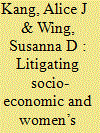| Srl | Item |
| 1 |
ID:
159481


|
|
|
|
|
| Summary/Abstract |
We provide new theory and evidence of the role of domestic women’s coalitions in the adoption of gender quotas. Previous research has shown the importance of women’s movements to policy change. We show that specific types of mobilization, often multiethnic in character, are a more precise way of describing these influences. Using a new dataset of coalitions in 50 countries in Africa (1989–2014), we first examine where coalitions are likely to emerge. Controlling for factors that correlate with their formation, we find that when domestic women’s organizations form a coalition for quotas, governments are more likely to adopt them and do so more quickly. This correlation holds when controlling for international aid, involvement of international women’s movements, and whether countries recently emerged out of major armed conflict, complementing recent scholarship that highlights global influences. A comparative case study of the adoption of a gender quota in Senegal and non-adoption in Benin helps illustrate the nuances of the theory.
|
|
|
|
|
|
|
|
|
|
|
|
|
|
|
|
| 2 |
ID:
185367


|
|
|
|
|
| Summary/Abstract |
Scholars debate the role of legal institutions in promoting human rights in Africa. Much of the discussion focuses on Anglophone countries and does not examine the gender of litigants. We propose a constitutionalism constrained perspective that argues that which and whose rights are adjudicated are shaped by the context of constitutional reform. Where reformists are primarily concerned with safeguarding civil and political rights, high courts may protect civil and political rights claims more often than socio-economic ones. Examining hundreds of human rights decisions issued by Benin’s Constitutional Court, we ask, which and whose rights does the court protect? We find the court is more likely to reject litigants’ claims on technical grounds when the issues involve socio-economic rights than when they concern civil or political rights. When a case is heard, moreover, the court finds violations of civil and political rights more often than socio-economic rights. Further, we find that an overwhelming percentage of litigants are men; women rarely appear as petitioners, although when women’s claims are heard, they are just as likely to succeed. Our findings about socio-economic rights and gender in Benin’s Constitutional Court have broader implications for understanding the limitations of constitutional reform.
|
|
|
|
|
|
|
|
|
|
|
|
|
|
|
|